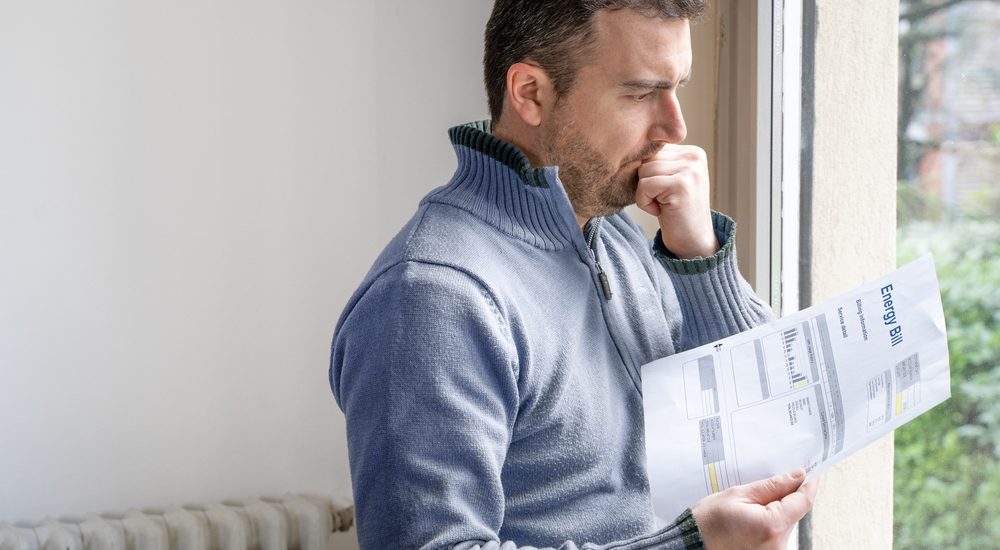- The energy price cap rises 6.4% on 1 April to £1,849 a year for a typical household
- This pushes it near the same level as May 2022 (£1,971), but with no £400 energy bill support
Energy bills are rising for a third consecutive time from 1 April, with the energy price cap increasing 6.4% to £1,849 a year for a typical household.
This is three years on from May 2022, when the cap level was £1,971 for a typical household and each one was given £400 of energy bill support, alongside one-off payments for those on certain benefits. From April 2025, the price cap will be only £120 less than this, with no energy bill support to help until later this winter². In the meantime, some parts of Britain pay much higher than average energy bills, including in North Wales and the Mersey.
National Energy Action Chief Executive Adam Scorer says, ‘Energy bills rising for a third time in a row is another blow for the millions of households struggling with the cost of energy and other essentials. A low-income household spending £1,849 a year or more on energy is not affordable.
‘We already see the impacts of sustained high bills – total energy debt is at record levels and rising, and people have been rationing their heating to dangerous levels and going without essentials. The additional support the government will put in place this winter will provide some welcome respite for some, but it won’t be deep enough to offset the impacts of these ongoing unaffordable bills.’
This rise comes soon after the announcement that Personal Independence Payments (PIP) eligibility will be scaled back. This could push a further 700,000³ disabled households into poverty, according to disability charity Scope.
National Energy Action’s recent polling with YouGov⁴ of adults in GB found that 49% of all respondents said they were likely to ration their energy use in the three months following the polling. But those with certain health conditions were more likely to expect to ration their energy:
- Arthritis (62%)
- Asthma (58%)
- Heart condition (57%)
- Mental health condition (58%)
Trish, a National Energy Action client, says, ‘Staying warm is a problem for me. I have cut back on heating, only using it when I can’t stand the cold anymore. I shower on a timetable; I don’t switch the oven on.
‘I feel the government could do more. I have worked from the age of 16 years, 45 years nursing, have never asked for handouts, paid my taxes but now when I need help the government isn’t interested in me. I don’t want much, just to be warm and a little hot food. Is that too much to ask?’
National Energy Action is calling for deeper energy bill support, an ongoing focus from the regulator and government to support households out of debt and, vitally, for the upcoming Warm Homes Plan to provide significant investment to insulate the coldest homes for the poorest households.
Notes to editors
- National Energy Action (NEA), is the national fuel poverty charity, working across England, Wales and Northern Ireland, to improve the lives of people in fuel poverty. We directly support people with energy and income maximisation advice, and we advocate on issues such as the current energy crisis and the need to improve the energy efficiency of our homes. See: www.nea.org.uk/.
- In May 2023, Ofgem lowered what the ‘typical’ domestic consumption value (TDCV) is, which is how the headline annual energy bill for the price cap is set. Under the previous TDCV, the April 2025 price cap would actually be £1,938 a year, less than £40 off what it was in May 2022, but without the £400 energy bill help. https://www.ofgem.gov.uk/decision/decision-typical-domestic-consumption-values-2023
- Scope open letter to the Chancellor: https://www.scope.org.uk/campaigns/open-letter-to-the-chancellor-the-cost-of-cuts-to-disability-benefits
- All figures, unless otherwise stated, are from YouGov Plc. Total sample size was 2,266 adults in GB. Fieldwork was undertaken between 15-16 January 2025. The survey was carried out online. The figures have been weighted and are representative of all GB adults (aged 18+).


